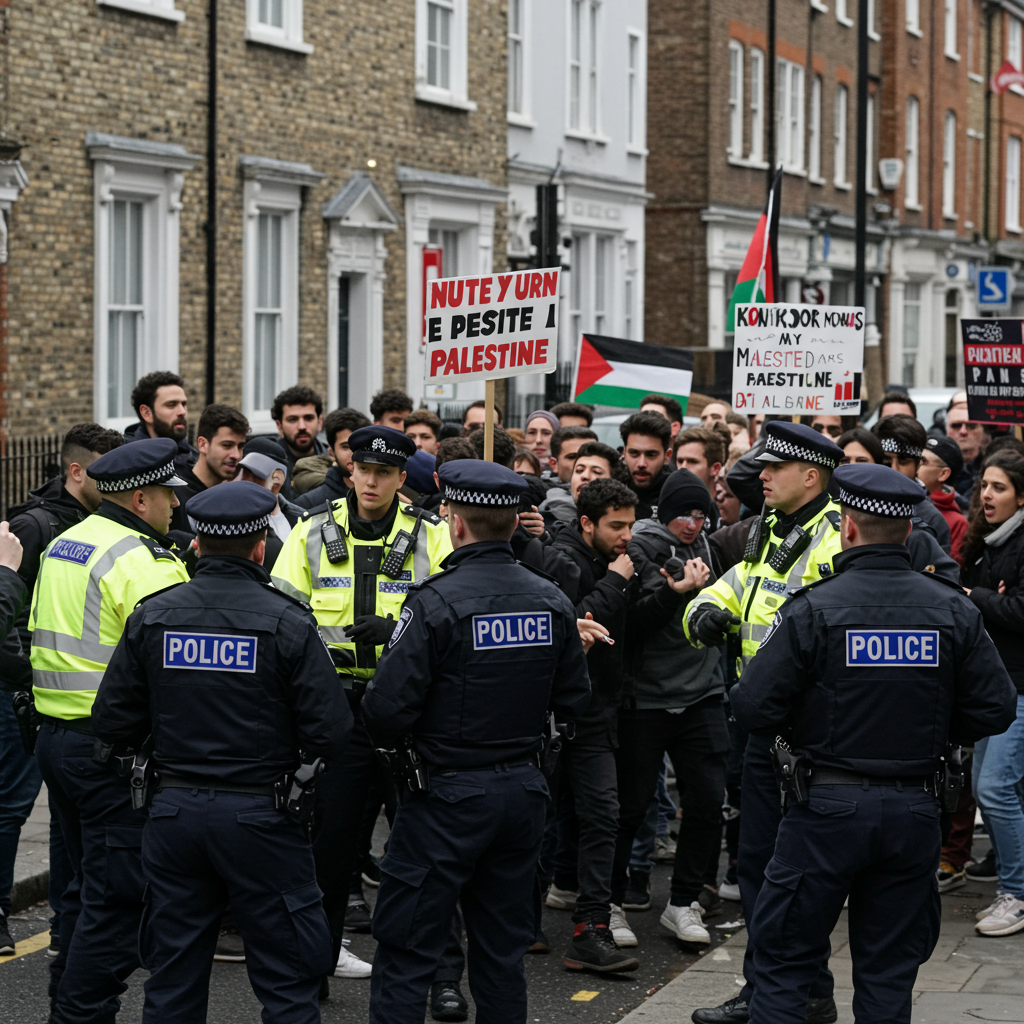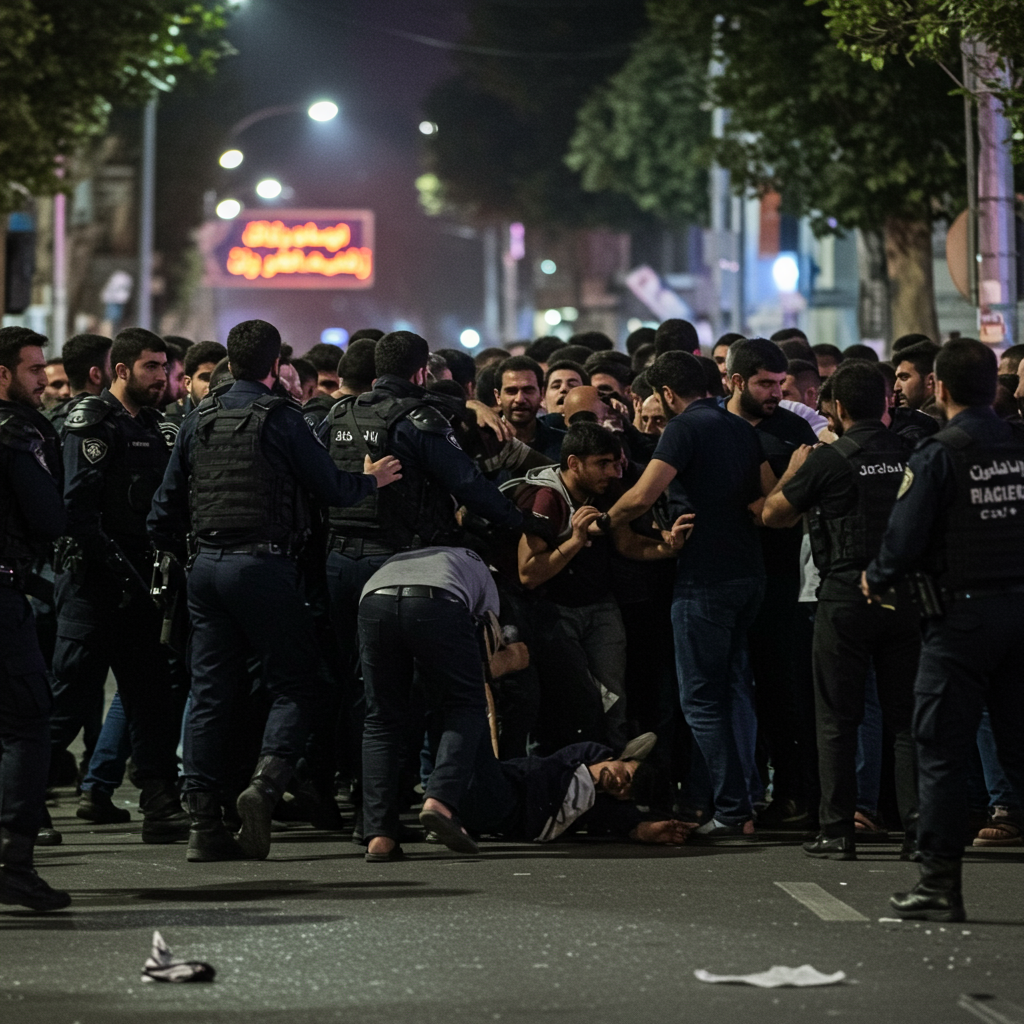Scores of individuals faced arrest across the United Kingdom during recent protests supporting the group Palestine Action. Law enforcement agencies confirmed that over 70 people were detained in multiple cities following demonstrations held the weekend after the organisation was officially designated a terrorist entity by the government. The arrests highlight the immediate legal ramifications of supporting a group now proscribed under counter-terrorism legislation.
Nationwide Protests Lead to Mass Arrests
On a Saturday in mid-July 2025, protests unfolded in major UK urban centres, including London, Cardiff, and Manchester. These gatherings were specifically organised to voice opposition to the government’s decision to ban Palestine Action. Police responding to the demonstrations made a total of 71 arrests across these locations. The overwhelming majority of these detentions were made on suspicion of committing offences under the Terrorism Act 2000, related to expressing support for a proscribed organisation.
Incidents Across Key Cities
In the capital, London, the Metropolitan Police reported making 42 arrests by late afternoon. Protesters had converged on Parliament Square for the second consecutive weekend. Some demonstrators were observed holding signs, with messages explicitly stating support for Palestine Action, despite the group’s recent ban. Officers reportedly searched bags, removed banners, and physically carried away individuals, including some who were lying down in passive resistance near prominent statues. One additional arrest in London involved a person suspected of common assault. Authorities emphasised that expressing support for a proscribed entity through chanting, clothing, or displaying symbols constitutes a potential criminal offence.
Meanwhile, in South Wales, police detained 13 individuals during a protest held outside the BBC offices near Cardiff’s Central Square. All 13 were arrested on suspicion of supporting a proscribed organisation. South Wales Police stated their commitment to facilitating lawful protest but underscored the need for adherence to the law. Further north, Greater Manchester Police apprehended 16 people in St Peter’s Square, Manchester. These arrests were also made under the Terrorism Act 2000. The protests were reportedly coordinated by the campaign group Defend Our Juries. A similar protest in London the previous weekend had resulted in 29 arrests, indicating a pattern of enforcement against public support for the newly banned group.
Understanding the Ban on Palestine Action
The widespread arrests stem directly from the UK government’s decision earlier in July 2025 to officially proscribe Palestine Action. This designation places the group on a list alongside other entities deemed terrorist organisations, such as Hamas and al-Qaida. Under the Terrorism Act 2000, membership in or support for a proscribed organisation is a criminal offence, potentially punishable by a prison sentence of up to 14 years. Palestine Action is notable as the first direct action protest group added to this list.
Why Was Palestine Action Proscribed?
According to government statements and sources, the ban was prompted by Palestine Action’s activities, which have primarily involved targeting companies believed to be involved in the arms trade, particularly since the escalation of the conflict in Gaza in late 2023. A key incident highlighted as preceding the proscription occurred in June 2025 at RAF Brize Norton. Activists linked to Palestine Action reportedly broke into the Royal Air Force base and allegedly caused significant damage to two Voyager aircraft by spraying them with paint and using crowbars. Police estimated the cost of the damage caused during this incident to be around £7 million.
Following the Brize Norton incident, four individuals were charged with conspiracy to commit criminal damage and conspiracy to enter a prohibited place for purposes prejudicial to UK safety or interests. These individuals remain in custody, while others arrested in connection with the incident have been released on bail or without charge. The Home Secretary, Yvette Cooper, cited the group’s “long history” of criminal damage and an increase in the frequency and severity of its actions since 2024 as justification for the ban. She argued that actions targeting the UK’s defence industry pose a risk to national security, which the government is committed to preventing. The proscription decision was subsequently approved by a vote in Parliament.
Controversy and Criticism Surrounding the Ban
The government’s move to proscribe Palestine Action has generated considerable debate and faced sharp criticism from various quarters. Critics, including legal experts, civil liberties groups, and even UN experts, have publicly condemned the ban. They argue that the government is misusing counter-terrorism legislation and potentially setting a dangerous precedent by applying it to a direct action protest group.
Legal challenges have been mounted against the proscription. Although an attempt to temporarily block the ban in court failed, the legal arguments presented highlight the contention surrounding the decision. A barrister representing a co-founder of Palestine Action described the ban during court proceedings as an “authoritarian abuse” of power. The inclusion of Palestine Action on a list with groups known for widespread violence has been particularly controversial, raising questions about whether the group’s activities, primarily focused on property damage, align with the typical definition of terrorism targeted by such legislation.
Broader Context
The context for Palestine Action’s activities and the subsequent protests and ban is the ongoing conflict in Gaza, which began following the Hamas attack on Israel in October 2023. This conflict has resulted in a significant humanitarian crisis and widespread casualties, fueling protests and activism globally, including in the UK, against actions perceived as supporting military activities in the region.
Frequently Asked Questions
What happened at the recent protests against the Palestine Action ban in the UK?
Over 70 people were arrested across London, Cardiff, and Manchester during protests held shortly after the UK government proscribed Palestine Action as a terrorist organisation. The arrests, totalling 71 across the three cities, were primarily made under the Terrorism Act 2000 on suspicion of showing support for a proscribed group. Protesters gathered in public squares and near significant buildings, holding signs expressing support for Palestine Action.
Why was Palestine Action officially banned, and what are the consequences?
Palestine Action was proscribed by the UK government under the Terrorism Act 2000 due to its history of criminal damage, particularly targeting arms companies. A significant incident cited was the alleged damage to aircraft at RAF Brize Norton in June 2025. The ban makes membership of or support for Palestine Action a criminal offence, potentially leading to up to 14 years in prison. This legal status means activities previously seen as protest, if interpreted as support, can now lead to terrorism-related charges.
What is the main controversy surrounding the decision to proscribe Palestine Action?
The proscription of Palestine Action is controversial because it applies terrorism legislation to a direct action protest group known primarily for property damage, rather than violence against people. Critics, including legal experts and civil liberties advocates, argue this is a misuse of the law and could set a dangerous precedent for criminalising protest. They question whether the group fits the definition of a terrorist organisation, contrasting it with others on the proscribed list like Hamas and al-Qaida.
The recent wave of arrests underscores the immediate and significant legal impact of the UK government’s decision to proscribe Palestine Action. As the first direct action group added to the list of banned terrorist organisations, its designation has triggered a strong reaction from supporters, leading to public demonstrations and subsequent law enforcement action under counter-terrorism powers. This situation highlights the tension between protest rights, civil liberties, and the application of national security legislation in the UK.



